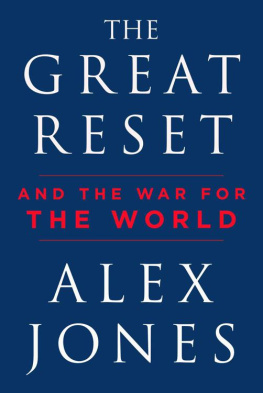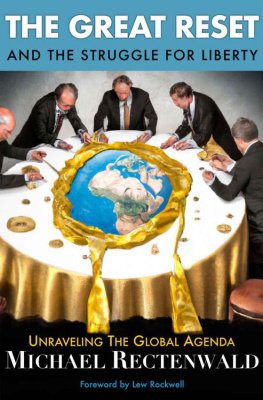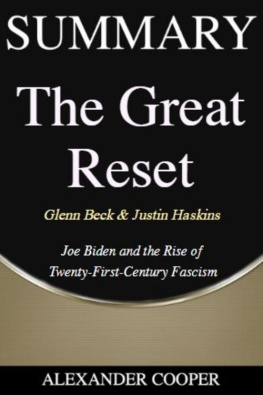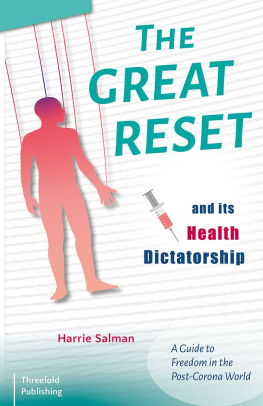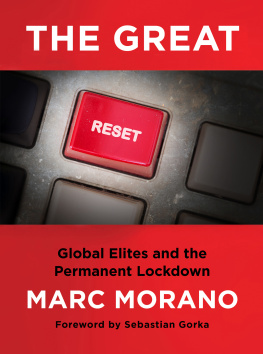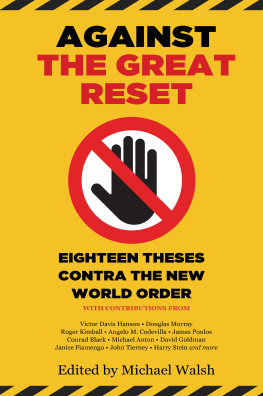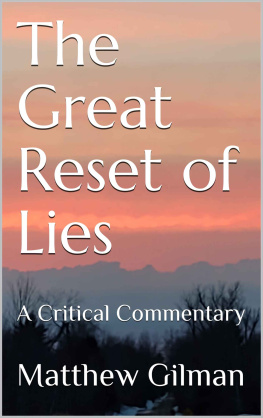

Copyright 2022 by Alex Jones
All rights reserved. No part of this book may be reproduced in any manner without the express written consent of the publisher, except in the case of brief excerpts in critical reviews or articles. All inquiries should be addressed to Skyhorse Publishing, 307 West 36th Street, 11th Floor, New York, NY 10018.
Skyhorse Publishing books may be purchased in bulk at special discounts for sales promotion, corporate gifts, fund-raising, or educational purposes. Special editions can also be created to specifications. For details, contact the Special Sales Department, Skyhorse Publishing, 307 West 36th Street, 11th Floor, New York, NY 10018 or .
Skyhorse and Skyhorse Publishing are registered trademarks of Skyhorse Publishing, Inc., a Delaware corporation.
Visit our website at www.skyhorsepublishing.com .
10 9 8 7 6 5 4 3 2 1
Library of Congress Cataloging-in-Publication Data is available on file.
Cover design by Brian Peterson
Print ISBN: 978-1-5107-7404-9
Ebook ISBN: 978-1-5107-7405-6
Printed in the United States of America
Contents
Forget the politicians. The politicians are put there to give you the idea that you have freedom of choice. You dont. You have no choice. You have owners. They own you. They own everything. They own all the important land. They own and control the corporations.
George Carlin
Welcome to the year 2030. Welcome to my cityor should I say, our city. I dont own anything. I dont own a car. I dont own a house. I dont own any appliances or any clothes. It might seem odd to you, but it makes perfect sense for us in this city. Everything you considered a product, has now become a service. We have access to transportation, accommodation, food and all the things we need in our daily lives. One by one all these things became free, so it ended up not making sense for us to own much. Forbes magazine article by a World Economic Forum contributor in 2016 titled Welcome to 2030: I Own Nothing,
Have No Privacy, and Life Has Never Been Better
THE
GREAT RESET
Chapter One What Is the Great Reset?
T heres an eternal tension in the human soul between the desire for freedom and the desire to be told what to do by those in authority.
The human ability to work together in partnership is one of the great strengths of humanity, as is the ability to dissent from the accepted wisdom of the day. Many pollsters have noted the trend that, no matter the question, theres roughly a quarter of the population that will have an opposing view. Some have taken to calling it the idiot 25 percent of the population, and yet I see it as an evolutionary advantage, giving humanity unprecedented flexibility.
Lets imagine were in a small tribe of about sixty people in the last Ice Age. Our leader, Thaag, tall, handsome, and a great warrior, suggests a certain route to the winter caves. Its the route the tribe has regularly used for the past several years.
But another member of the tribe, Uther, says, Theres been a lot of early snow, the glaciers are advancing, and I think that route will likely be blocked. Many might starve if we take that route. I know another route. Its a little longer, with some challenging terrain, but well definitely make it to the winter caves. Uther is known as the thinker of the tribemaybe hes a medicine manand sometimes he seems a little crazy, like when he starts talking about the spirits of the ancestors.
Many outcomes are possible.
Neither Thaag nor Uther knows the actual truth about which route makes the best sense.
Thaag and Uther might be enemies, with long-simmering rivalries. Thaag might demand the tribe take the traditional route, declaring that any who do not follow his decision should be banished from the tribe. Uther might respond that Thaag makes poor decisions, thus questioning his leadership of the tribe. Maybe there are ten to fifteen people who side with Uther, and they take the alternate, longer route to the winter caves. The group following Thaag all die, but the small band led by Uther survives. Maybe the group led by Uther, being much smaller in size, meets with another tribe who wipes them out.
The tribe survives, but, whether it is Thaags or Uthers group that survives, the community is greatly weakened.
However, maybe Thaag and Uther are the best of friends, respecting the strengths of the other while also understanding the weaknesses. Uther understands that persuading Thaag is the best chance to ensure the survival of the greatest number of their people. And Thaag understands that some of Uthers crazy ideas have resulted in unprecedented success.
They talk and come up with a plan. Theyll start the trek to the winter caves on the traditional route but send their fastest runners ahead to make sure the path is open. If the traditional route is blocked, at the early stages of the journey it will be easy to take a detour and switch to Uthers route.
That is how the strongest tribes are created, by talking through disagreements, and coming up with better plans.
This is not what we are doing in our world today.
* * *
For those readers who are more religiously minded, you might ask, What does the Bible say about the proper role between rulers and the people?
You might be surprised to learn that one of the earliest books of the Bible, the Book of Samuel, takes a very dim view of rulers, especially kings.
The Book of Samuel takes place after the Jews have fled Egypt in the Exodus and reestablished themselves in Israel. At this time, Israel had no king but instead had judges who would settle issues brought before them. This period was known as the Age of Judges and lasted about a century.
In his old age Samuel appointed his sons judges over Israel. His first-born was named Joel, his second son, Abijah; they judged at Beer-sheba. His sons did not follow his example but sought illicit gain and accepted bribes, perverting justice. Therefore, all the elders of Israel came in a body to Samuel at Ramah and said to him, Now that you are old, and your sons do not follow your example, appoint a king over us, as other nations have, to judge us.
Samuel was displeased when they asked for a king to judge them. He prayed to the Lord, however, who said in answer, Grant the peoples every request. It is not you they reject, they are rejecting me as their king. As they have treated me constantly from the day I brought them from Egypt to this day, deserting me and worshipping strange gods, so do they treat you too. Now grant their request; but at the same time, warn them solemnly and inform them of the rights of the king who will rule over them.
Samuel delivered the message of the Lord in full to those who were asking him for a king. He told them: The rights of the king who will rule you will be as follows: He will take your sons and assign them to his chariots and horses, and they will run before his chariot. He will also appoint from among them his commanders of groups of a thousand and of a hundred soldiers. He will set them to do his plowing and harvesting, and to make his implements of war and the equipment of his chariots.
He will use your daughters as ointment-makers, as cooks, and as bakers. He will take the best of your fields, vineyards, and olive groves, and give them to his officials. He will tithe your crops and your vineyards, and give the revenue to his eunuchs and his slaves. He will take your male and female servants, as well as your best oxen and asses, and use them to do his work. He will tithe your flocks and you yourselves will become his slaves. When this takes place, you will complain against the king whom you have chosen, but on that day the Lord will not answer you.
Next page
